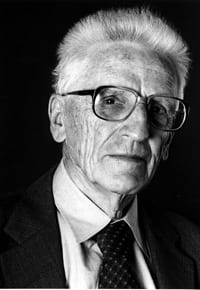Donald R. Griffin
The Woods Hole Oceanographic Institution has received word of the death November 7, 2003, of Honorary Member of the Corporation Donald R. Griffin at his home in Lexington, MA. He was 88.
Donald Redfield Griffin was elected a Member of the Corporation in 1964 and an Honorary Member of the Corporation in 1986. He served on the Visiting Committee for the Biology Department in 1968, and joined the Associates in 1975. He was the nephew of Alfred C. Redfield, one of the first WHOI staff members and namesake of Redfield Laboratory.
Born in Southampton, NY, on August 3, 1915, Donald Redfield Griffin received bachelor, master and doctoral degrees in zoology from Harvard between 1938 and 1942. World renowned for his work on animal behavior, animal navigation, acoustic orientation and sensory biophysics, Donald Griffin established a reputation in animal behavior early in his career. While an undergraduate at Harvard in 1938, he and a fellow student Robert Galambos used microphones to prove that bats “see in the dark” by emitting ultrasonic sounds and listening for the return echoes, solving the mystery of how bats navigate in the dark and catch their insect prey. He is credited with coining the term “echolocation” and wrote the 1958 book Listening in the Dark on the topic. The discovery was considered a major breakthrough not only in zoology but also in the development of radar and sonar systems.
After graduating from Harvard, Griffin joined the faculty at Cornell University, rising to the position of professor before returning to Harvard, where he worked from 1953 until 1965. He joined the Rockefeller University faculty in 1965 and retired in 1986, later serving as an emeritus professor in animal behavior.
Considered by many the creator of the field of cognitive ethology, the study of animal behavior under natural conditions, Griffin pioneered techniques to study animals in their natural habitats. He followed birds out to sea and flew kites on the beach to study how seabirds soar without flapping their wings. In his 1976 book The Question of Animal Awareness, he suggested that animals could have conscious minds like those of humans and be capable of thinking and awareness. The idea had been proposed by other scientists, including Charles Darwin who wrote a book on the issue, but was considered very controversial. Critics said animals could be programmed like computers to perform behaviors without consciousness. Despite the skeptics Griffin continued to explore the topic, publishing Animal Minds: Beyond Cognition to Consciousness in 1992.
Griffin spent his final years in Lexington, MA working at Harvard University’s Concord Field Station, where he was using microphones to study the noises beavers made in their lodges.
Donald Griffin was a member of the National Academy of Sciences, American Academy of Arts and Sciences, American Philosophical Society, Animal Behavior Society and the American Physiological Society.
He is survived by two daughters, Janet Abbott of Arlington, MA and Margaret Griffin of Montreal, and a son, John, of Brighton, MA. His daughter Nancy Griffin Jackson, died in 1993 and his wife, Jocelyn Crane, a researcher and assistant to explorer William Beebe, died in 1998.

